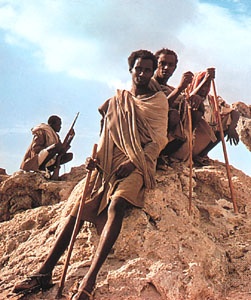Afar
people
Amharic Adal, Arabic Denakil,
 a people of the Horn of Africa who speak Saho, a language of the Eastern Cushitic branch of the Afro-Asiatic (formerly Hamito-Semitic) family. They live in northeastern Ethiopia and in Djibouti, where, with the Issas, they are the dominant people. It is thought that the Afars were the first of the present inhabitants of Ethiopia to elaborate their pastoral life into full-scale nomadism, descending from the highlands of southeast Ethiopia and migrating to the stony desert area of Denakil, the name used by surrounding tribes to identify them.
a people of the Horn of Africa who speak Saho, a language of the Eastern Cushitic branch of the Afro-Asiatic (formerly Hamito-Semitic) family. They live in northeastern Ethiopia and in Djibouti, where, with the Issas, they are the dominant people. It is thought that the Afars were the first of the present inhabitants of Ethiopia to elaborate their pastoral life into full-scale nomadism, descending from the highlands of southeast Ethiopia and migrating to the stony desert area of Denakil, the name used by surrounding tribes to identify them.The Afars' subsistence economy depends on livestock, especially goats, some camels, and, more rarely, cattle. There are some exceptions, such as fishermen in the coastal areas and agriculturalists in the Assau oasis. The Afars also mine and export salt.
Proud, highly individualistic, and much feared by outsiders, the Afars are organized in patrilineal kin groups. Cooperation in larger units such as subtribe or tribe is induced only by warfare against other tribes or neighbouring peoples. Two distinct classes, the Asaimara (“Red Men”) and the Adoimara (“White Men”), constitute the landowning, titled nobles and the lower-class tenants, respectively.
Age-sets exist wherein people of the same age group are subject to a chief who settles disputes among them. Beyond this, legal procedure consists of the rules for compensation for adultery—a system of fines to the injured husband or father—and revenge for homicide. Blood feuds are a principal, perennial, and costly occupation, except among the few sultanates, notably at Assau, in which despotic law is backed up with an army.
The Afars are nominally Muslim, but a minimal level of orthodoxy in practice is attained only in the coastal regions and in the sultanates. The nomads of the interior are lax, and, though they hold Islam in great esteem, their own practices are imbued with the earlier Cushitic religion.
- Louis XII
- Louis XIII
- Louis XIII style
- Louis XIV
- Louis XIV style
- Louis XV
- Louis XVI
- Louis (XVII)
- Louis XVIII
- Louis XVI style
- Louis XV style
- Louis Zukofsky
- louping ill
- Loup River
- Lou Rawls
- Lourdes
- Lou Reed
- Lourenço de Almeida
- louse
- louse fly
- lousewort
- Louth
- Loutherbourg, Philip James de
- louver
- Louvet, Jean